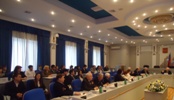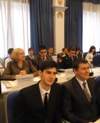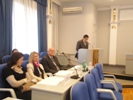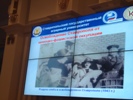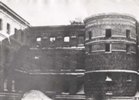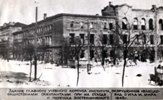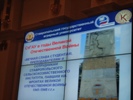Teachers and students of university continue to take active part in the actions devoted to the 70 anniversary from the date of liberation of Stavropol from fascist aggressors. On
January 29 the group of students of electrical power faculty under the leadership of the professor of chair of philosophy and S. B. Kalinchenko's history took part in meeting of "a round table" on the subject "Preservation for Future Generations of Historical Memory of the Victory of Compatriots in Great War of 1941−1945", carried out at the initiative of the Sanhedrim at the chairman of the Duma of Stavropol Krai. During meeting interesting and instructive dialogue of two generations – the veterans who have brought release to the native land, and those whom further to protect and preserve its peace and rest took place. On behalf of students of the Stavropol state agrarian university the student of electrical power faculty Sergey Beglaryan acted. Its performance was devoted to occupation and liberation of Stavropol (Voroshilovsk) from немецко−фашистских aggressors. In its report the unique historic facts connected with university in that terrible wartime sounded. From the Great Patriotic War beginning the most part of students and teachers of institute left on the front. The example was set by the director of institute Gerasim Hrisanfovich Alafinov who has left on the front in a rank of the major. The staff of the institute which has remained in the city, was mobilized for defensive works on approaches to Stavropol. The main educational case was given for hospital. During occupation of Stavropol, begun on August 3, 1942, the building of the main educational case strongly suffered from city bombardments. Hostels were burned. The heavy fate comprehended many students and teachers of higher education institution during occupation. After city release teachers and students by own efforts restored buildings of institute, hostels. In the conclusion of the report of S. Beglaryan emphasized that to remember tragic pages of history of the Great Patriotic War, they should be re-read, studied and constantly to supplement, again and again addressing to archives, scientific researches, memoirs and, at last, to oral attestations of eyewitnesses.

